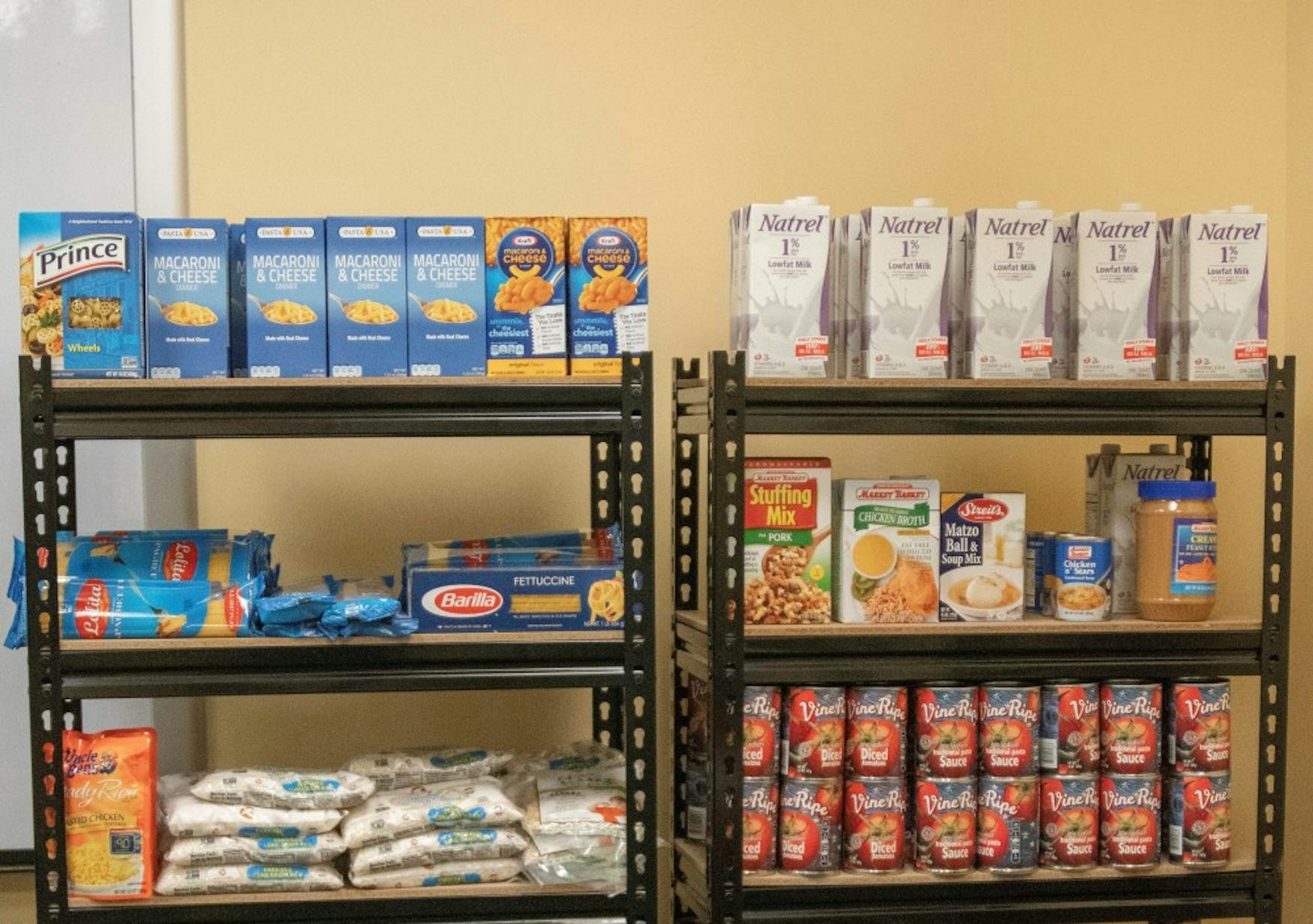Brandeis Food Pantry opens to counter student food insecurity
After months of work behind the scenes, the Brandeis Food Pantry celebrated its official opening on Friday. Located in Kutz Hall across from the Registrar’s Office, the BFP is open to all members of the Brandeis community and provides non-perishable canned items and personal care products.
In an interview with the Justice, Senior Associate Dean of Arts and Sciences for Undergraduate Education Elaine Wong explained that addressing food insecurity among Brandeis students Brandeis has been “a matter under discussion for many years now.” According to Wong, the current Brandeis Food Pantry initiative started in July 2018 when a committee focused on international student concerns raised the issue of food insecurity for Brandeis’ international students.
Wong shared that Kim Godsoe, the associate provost for Academic Affairs, spoke to University Provost Lisa Lynch, who donated funds allowing the committee to purchase food for international students this summer. The temporary food pantry was set up in the Shapiro Campus Center’s TV lounge. Later in the summer, the pantry was moved to its current location in Kutz Hall, which is a “more secure location,” according to Wong.
In an email to the Justice, Lynch cited 2017 research from the Urban Institute that showed that anywhere between 11 and 20 percent of students who attend four-year institutions suffer from food insecurity.
Leah Berkenwald ’07, the University’s Wellness Promotion Program manager, explained in an email to the Justice the role of the National College Health Assessment survey administered earlier this semester in clarifying the impact food insecurity has on Brandeis students.
This year, Berkenwald said, she included questions about food security in the NCHA survey. The University plans to administer the survey every two years and to include these questions on future surveys as part of the long-term plan to combat food insecurity. According to Berkenwald, this will help the University “track the need for resources and our success with the food pantry as well as other initiatives.”
In her email, Lynch explained, “From our own work with students, we know that undergraduate and graduate students who live off campus are most at risk for food [in]security.” She continued, “I do not want to have any student going to class on an empty stomach because they don’t have enough to food to eat.” For the University, the creation of the food pantry is a step toward actively dealing with a problem that, according to Lynch, “is something [also] experienced by our surrounding community.”
Over the summer, the Brandeis Food Pantry Working Group consisted of 16 members. Together, these individuals worked on developing a comprehensive plan for the BFP that took into account perspectives from offices across campus.
Numerous departments on campus have representatives on the Brandeis Food Pantry Working Group, including Academic Services, Health Services, International Students and Scholars Office, the Office of Diversity, Equity & Inclusion and Waltham Group, among others. Wong, Assistant Director of Graduate Student Affairs Steven Weglinski and Food Pantry Graduate Assistant Priscilla Rwandrugali, who now manages the Food Pantry, also played instrumental roles in organizing the project.
According to Weglinski, the Food Pantry has three main sources for food: its official partnership with the Greater Boston Food Bank, the Food for Fines Program with the Brandeis Library and continuing donations from members of the Brandeis community.
Julie Donoghue from GBFB wrote to the Justice and explained that the the organization partners with 500 member agencies in eastern Massachusetts. Agencies wishing to partner with GBFB must be evaluated to determine whether they fit with GBFB’s mission to create a “healthy and hunger-free Eastern Massachusetts.”
Donoghue explained that Weglinski and Rwandrugali filled out the necessary form and spoke with her regarding the creation of the Brandeis Food Pantry. Donoghue wrote, “I came out [to Brandeis] and met with Steven and Priscilla — they showed me their unique iPad sign in system and explained how the volunteer hours will work.” Once gaining GBFB’s approval, the only thing that remained was actually launching the food bank.
With its partnership with GBFB, BFP has access to an online system that works similar to ordering food online. The GBFB will be the primary sustained food source for the pantry.
Referencing the partnership with GBFB, Donoghue wrote, “I know that Brandeis University has a big focus on social justice so it’s great to now have them as a members agency … as we all work together to end hunger in our state.”
The Brandeis Library worked with the BFP to create a Food for Fines Program, which began in late October. Students can now pay their overdue library fines by donating hygiene or non-perishable food items to the pantry.
In an Oct. 23 Justice article, Brenda Cummings, director of Public Services at the Brandeis Library, was quoted as saying, “we really want Food for Fines to be a year-long thing. With Brandeis being a school of social justice this is important.”
In the words of Berkenwald, “The food pantry and efforts like it are crucial to upholding Brandeis’ commitment to supporting student success, equity and wellness.”
Brandeis faculty, staff and students interested in contributing to the BFP can drop off non-perishable goods or personal care items at three locations: Brandeis Food Pantry (Kutz 102), Office of the Provost (Irving 102) or the Department of Community Service and Student Activities (Shapiro Campus Center 203).
In an email to the Brandeis community, the Brandeis Food Pantry Working Group listed the pantry’s operating hours: Monday to Thursday noon to 2 p.m. and 5 p.m. to 9 p.m., Friday noon to 2 p.m. and 5 p.m. to 8 p.m. The email notes that if someone is unable to access the Food Pantry during operation hours, emailing foodpantry@brandeis.edu to schedule another time to visit is also an option.



Please note All comments are eligible for publication in The Justice.